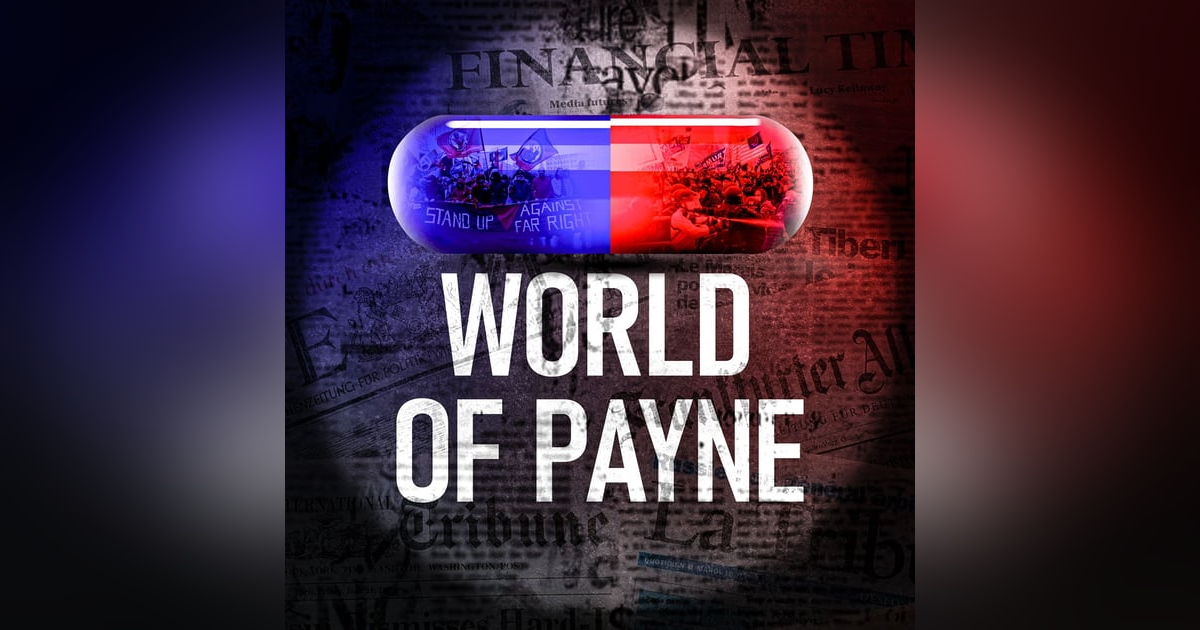The Inflation Squeeze: How Rising Prices Impact the Middle Class
Welcome to a deeper dive into the economic issues we explored in our latest episode of the World of Payne Podcast: "The Silent Crisis: America’s Debt Spiral and the Vanishing Middle Class." In that episode, we discussed the alarming state of America's national debt, persistent inflation, and the resulting strain on the middle class. Here, we will expand on those topics, providing a more detailed analysis of the challenges faced by American families and potential strategies for navigating these turbulent economic times. We'll also explore the policies contributing to the problem and the importance of responsible financial stewardship.
Introduction: The Inflation Squeeze on the Middle Class
The American middle class, long considered the backbone of the nation, is facing unprecedented economic pressures. Persistent inflation, fueled by complex factors including government spending and supply chain disruptions, is eroding the purchasing power of hardworking families. The rising costs of essential goods and services – from groceries and gasoline to healthcare and education – are squeezing household budgets, making it increasingly difficult for families to maintain their standard of living. This blog post will delve into the key factors contributing to this economic squeeze, analyze its impact on the middle class, and explore potential strategies for coping with the financial strain.
The National Debt Crisis: A $38 Trillion Burden
One of the most significant factors contributing to the current economic challenges is the burgeoning national debt. As we discussed in the podcast episode, the debt has surpassed a staggering $38 trillion, and it continues to grow at an alarming rate. This massive debt creates a significant burden on future generations and limits the government's ability to invest in critical programs and services. Furthermore, the interest payments on the debt consume a substantial portion of the federal budget, diverting resources from other important areas like education, infrastructure, and research and development.
Stubborn Inflation: Lingering Near 3 Percent
Despite efforts to curb inflation, it remains stubbornly elevated, hovering near 3 percent. This persistent inflation has a direct and immediate impact on the cost of living for American families. When prices for essential goods and services rise, households have less disposable income to spend on other things, leading to a decline in overall economic activity. Inflation also erodes the value of savings, making it more difficult for families to achieve their long-term financial goals, such as retirement and homeownership. The Federal Reserve's efforts to combat inflation through interest rate hikes can also negatively impact the economy by slowing down growth and potentially leading to job losses.
Rising Gas Prices: An Added Strain
Another factor contributing to the inflation squeeze is the rise in gasoline prices. As the price of crude oil fluctuates due to geopolitical events and supply chain disruptions, consumers feel the pinch at the pump. Higher gas prices not only increase the cost of commuting but also impact the cost of transporting goods, leading to higher prices for a wide range of products. For many middle-class families, particularly those who rely on their vehicles for work or live in areas with limited public transportation, rising gas prices can significantly strain their budgets and make it more difficult to make ends meet.
Reckless Policies and Partisan Gridlock: The Root Causes
Many economists and political analysts argue that reckless fiscal policies and partisan gridlock in Washington are major contributors to the current economic challenges. Excessive government spending, often fueled by political considerations rather than sound economic principles, has contributed to the national debt and inflationary pressures. Partisan gridlock makes it difficult to enact meaningful reforms to address these issues, as lawmakers from different parties often prioritize their own political agendas over the well-being of the country. This lack of cooperation and compromise can lead to policy paralysis and further exacerbate the economic problems facing the middle class.
The One Big Beautiful Budget Act: Cuts and Their Impact
The "One Big Beautiful Budget Act," a hypothetical example used for illustrative purposes, represents an attempt to address the growing national debt through spending cuts. While such measures may be necessary to rein in government spending, they can also have unintended consequences. For example, cuts to social programs like education, healthcare, and housing assistance can disproportionately impact low- and middle-income families, further exacerbating their financial struggles. It is crucial to carefully consider the potential impact of spending cuts on vulnerable populations and to implement them in a way that minimizes harm and promotes long-term economic growth.
New Spending Bills: Erasing the Cuts
Conversely, new spending bills, often enacted in response to perceived needs or political pressures, can undermine efforts to control the national debt and combat inflation. While some spending may be necessary to address critical issues like infrastructure or national security, excessive or poorly targeted spending can contribute to the problem. Furthermore, new spending bills often require increased borrowing, further adding to the national debt and creating a cycle of debt accumulation. A balanced approach is needed, one that prioritizes responsible fiscal management while also addressing the needs of the population.
The Debt Spiral: A Dangerous Cycle
The combination of rising debt, persistent inflation, and political dysfunction creates a dangerous debt spiral. As the national debt grows, the government must borrow more money to finance its obligations, leading to higher interest payments and further increasing the debt. This cycle can become self-perpetuating, making it increasingly difficult to break free from the burden of debt. Ultimately, the debt spiral can lead to a fiscal crisis, undermining the stability of the economy and jeopardizing the financial well-being of future generations.
Political Dysfunction: Crushing Working Families
Political dysfunction in Washington, characterized by partisan gridlock and a lack of cooperation, exacerbates the economic challenges facing working families. When lawmakers are unable to compromise and enact meaningful reforms, the problems facing the middle class persist and even worsen. This political dysfunction can create a sense of frustration and disillusionment among voters, leading to decreased civic engagement and further undermining the ability of the government to address the issues facing the country.
The Impact on Essential Goods and Services
The inflation squeeze is having a profound impact on the affordability of essential goods and services. The rising costs of groceries, gasoline, healthcare, housing, and education are making it increasingly difficult for middle-class families to meet their basic needs. Many families are forced to make difficult choices, such as cutting back on healthcare or delaying retirement, in order to make ends meet. This erosion of the standard of living can have long-term consequences for the health, well-being, and economic security of the middle class.
Strategies for Coping with Financial Strain
Despite the challenges, there are strategies that families can employ to cope with the financial strain of inflation. These strategies include:
- Budgeting and tracking expenses: Creating a budget and tracking expenses can help families identify areas where they can cut back on spending.
- Reducing discretionary spending: Limiting non-essential spending, such as dining out and entertainment, can free up more money for essential needs.
- Seeking out discounts and deals: Taking advantage of discounts, coupons, and sales can help families save money on everyday purchases.
- Negotiating bills and rates: Negotiating with service providers, such as cable and internet companies, can help families lower their monthly bills.
- Exploring alternative income streams: Seeking out part-time work or freelance opportunities can supplement income and provide additional financial security.
- Investing in education and skills development: Investing in education and skills development can increase earning potential and provide greater job security.
ValorBuilt Apparel – Supporting American Values
As mentioned in the podcast episode and show notes, we are proud to be sponsored by ValorBuilt Apparel. ValorBuilt Apparel is a company committed to producing high-quality, American-made clothing that reflects patriotic values. Supporting businesses that prioritize American manufacturing and ethical labor practices is one way to contribute to a stronger and more resilient economy.
Sequence.io - Streamlining Business Processes
Another fantastic sponsor of the podcast, Sequence.io, helps businesses streamline their processes. Efficient business processes translate into cost savings, which in turn can benefit consumers through competitive pricing. By supporting innovative companies like Sequence.io, we contribute to a more efficient and productive economy.
A Call to Stewardship, Responsibility, and Unity
Addressing the economic challenges facing the middle class requires a collective effort. It is crucial for individuals to practice responsible financial stewardship, for policymakers to enact sound fiscal policies, and for citizens to demand accountability from their elected officials. Furthermore, it is essential to foster a sense of unity and cooperation, putting aside partisan differences to work together towards solutions that benefit all Americans.
Conclusion: Navigating the Economic Challenges Ahead
The inflation squeeze is placing immense pressure on the American middle class. As we discussed in this post, which expands on the topics covered in our podcast episode, "The Silent Crisis: America’s Debt Spiral and the Vanishing Middle Class," a multitude of factors, including the national debt, persistent inflation, and political dysfunction, contribute to this economic strain. However, by understanding the challenges, implementing sound financial strategies, and demanding responsible leadership, we can navigate these turbulent times and work towards a more prosperous future for all Americans. The issues discussed in the podcast, and expanded on here, require a long-term commitment to responsible fiscal policies and a renewed focus on the economic well-being of the middle class. Thank you for joining us in this important conversation.



